Coal is one of the sources of fossil energy that's widely used by humans today. it was produced when land and water plants accumulate and buried during geographical periods transmitted by heat and pressure. 1/3 of the coal in the world was formed in the Paleozoic era while the rest was formed in the Mesozoic and Cainozoic eras. that means coal has gone through a very long process before it can be used by humans.
Coal has always been consistent as a source of energy for mankind. especially when it comes to energy sources for electricity generation then coal is the main global energy source used by humans.
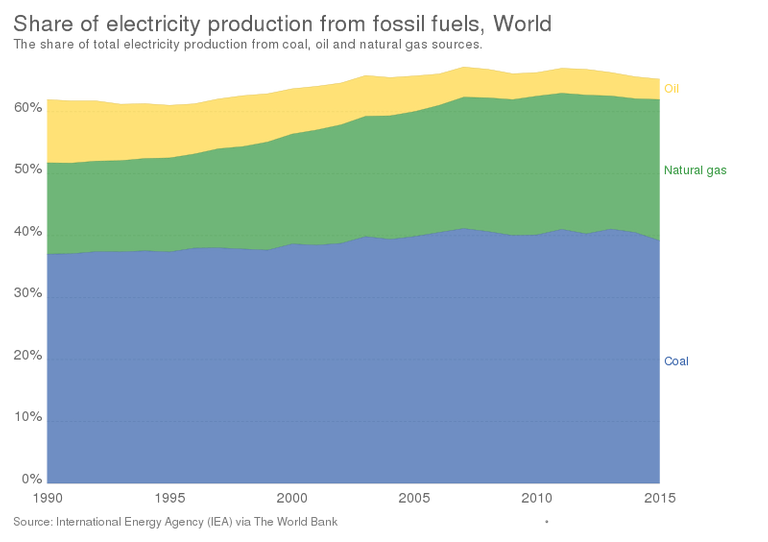

When it comes to the Levelised cost of electricity, Coal can be classified as cheaper than energy sources such as nuclear and gas. so it's not surprising that coal is the main energy source for electricity
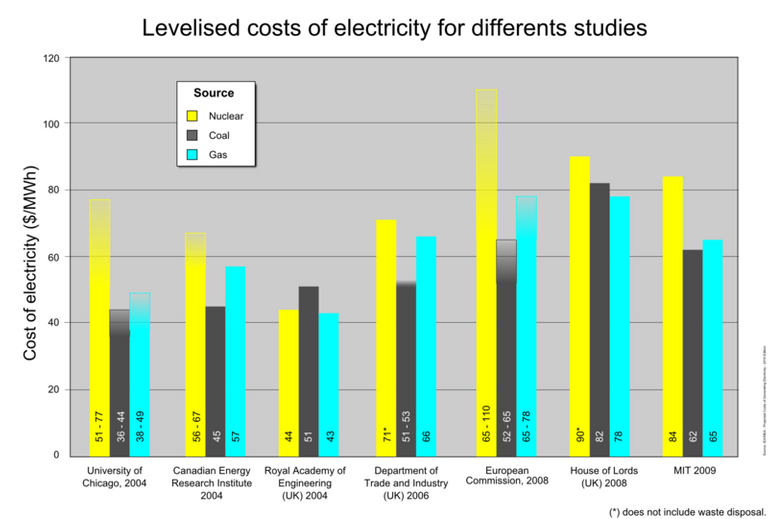
We certainly need to be realistic that in today's industrial era, the need for abundant and cheap energy is an important matter. and consider that coal supplies are more abundant compared to other fossil energies is also the main factor why coal is in demand.
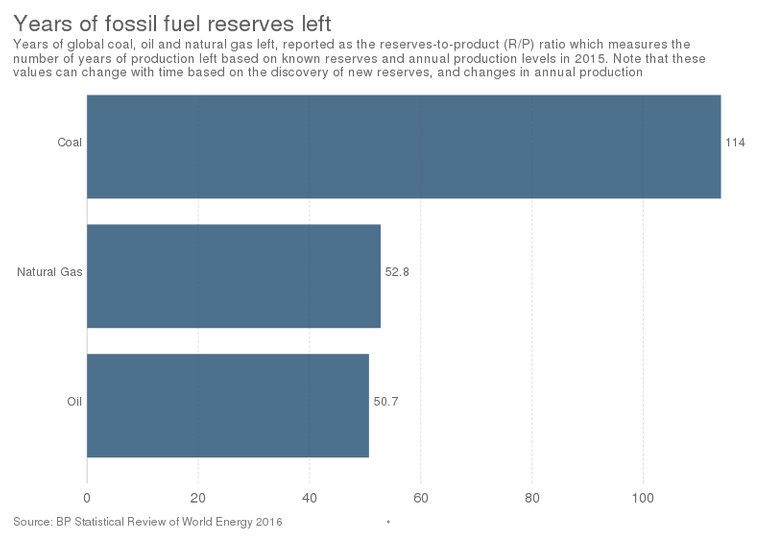

So, Economically, the use of coal is more profitable than other fossil energy sources.
However, coal has a big weakness to our environment, coal occupies the first position as one of the fossil energies that emit the most Co2. and it's not good for our environment if the use of coal becomes more massive.
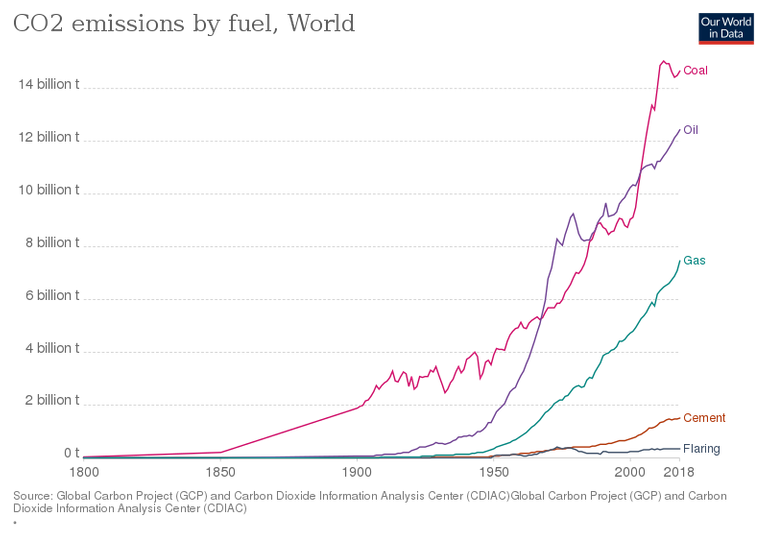

This also makes most countries in the world commit to reduce and ultimately endeavor to leave coal as a source of energy as a whole.
Based on 2016 data, the top 5 coal-consuming countries in the world are China, India, USA, Japan, and Russia.
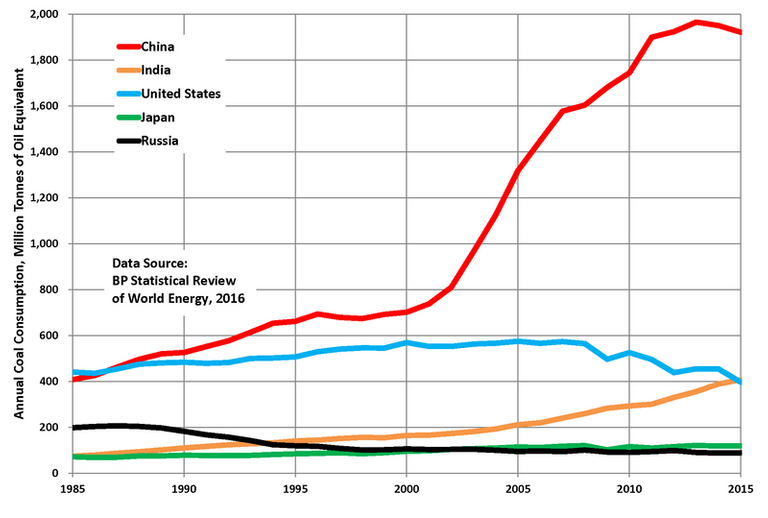
Of the five countries, the USA is one of the countries that are most trying and looks serious in reducing coal as their energy source. This is evidenced by their declining position to third place as a country that uses coal as an energy source. whereas previously in 2014 they were in the second position after China. now that position is held by India.
The same thing is seen in Russia, which is also experiencing a downward trend in coal consumption as their energy source.
The latest 2019 data contained in an article statista.com Regarding the top countries consuming coal as their energy source, it shows that Russia has dropped to the sixth position as a country that consumes coal as an energy source. and the fifth position is taken over by South Africa, while the other positions remain the same where China and India still dominate coal consumption in the world today. and the trend is rising up.
In fact, statistically, there is a decrease in coal use occurring in Europe and the United States, but it tends to increase in Asian countries such as China and India. Moreover, China is one of the world's economies that is growing rapidly today and is also the largest coal-producing country in the world, so it's no wonder they need coal energy which is relatively cheap and abundant for their industry. and it's a realistic option for China.
However, the Chinese government intends to reduce the use of coal as their energy source. they are targeting to be free from fossil energy or neutral carbon in the next 2060 as well. India, on the other hand, is the second most coal-using country, setting a faster target than China for being carbon neutral by 2050.
The economic interests of coal and the interests of a better environment are a dilemma for countries in the world. especially developing countries that need abundant and cheap energy sources to support their growing economies. this issue has also been highlighted by Robert F. Ichord, Jr. which is a nonresident senior fellow at the Atlantic Council's Global Energy Center, which highlighted efforts and campaigns to reduce the use of coal will have an impact on developing countries such as in Southeast Asia and South Asia which still use coal as their energy source. Of course, this is without reason, the cheap price of coal so that it can be affordable by the people of these countries is a major consideration. Moreover, the development of renewable energy infrastructures such as solar energy and hydropower requires a large investment and it's quite difficult for those countries to implement.
On the other hand, countries such as Australia, Indonesia, USA and Russia which are the top five coal exporting countries must also be willing to lose their income from coal exports. and Indonesia is probably the one who will be greatly affected by this because apart from being a developing country, the limited infrastructure to support renewable energy is also inadequate, this is in contrast to Russia which is also a developing country but is technologically ready to reduce their production and use of coal.
Conclusion
Efforts to reduce to eliminate the use of coal as an energy source are quite difficult to do. On the one hand, coal provides good economic benefits to industry, especially for developing countries, but on the other hand, the use of coal, which is one of the fossil energies that produce the most carbon emissions that endanger our environment.


References
- https://en.wikipedia.org/wiki/Coal
- https://www.eia.gov/energyexplained/electricity/electricity-in-the-us.php
- https://www.world-nuclear.org/nuclear-essentials/where-does-our-electricity-come-from.aspx
- https://www.carbonbrief.org/mapped-worlds-coal-power-plants
- http://www.coaleducation.org/q%26a/10_reasons_why_coal.htm#:~:text=Kentucky%20Regulatory%20Agencies-,10%20reasons%20why%20coal%20is%20a%20good%20energy%20source%3A,nuclear%2C%20natural%20gas%2C%20oil.
- https://www.nytimes.com/2018/11/24/climate/coal-global-warming.html
- https://www.weforum.org/agenda/2021/01/coal-demand-asia-decarbonize-emissions/
- https://www.worldcoal.org/coal-facts/what-is-coal-where-is-it-found/
- https://www.eia.gov/energyexplained/coal/how-much-coal-is-left.php
- https://www.worldometers.info/coal/
- https://www.statista.com/statistics/265510/countries-with-the-largest-coal-consumption/
- https://www.worldometers.info/coal/us-coal/
- https://www.worldometers.info/coal/russia-coal/
- https://www.worldometers.info/coal/india-coal/
- https://www.worldometers.info/coal/china-coal/
- https://www.theatlantic.com/science/archive/2020/01/americas-coal-consumption-entered-free-fall-2019/604543/
- https://www.bloomberg.com/news/articles/2020-09-23/china-wants-to-be-carbon-neutral-by-2060-is-that-even-possible
- https://www.bloomberg.com/news/articles/2021-03-17/india-considers-net-zero-goal-around-2050-a-decade-before-china
- https://www.weforum.org/agenda/2021/01/coal-demand-asia-decarbonize-emissions/
- https://www.worldstopexports.com/coal-exports-country/
- https://www.azocleantech.com/article.aspx?ArticleID=836
- https://www.atlanticcouncil.org/blogs/energysource/the-climate-and-equity-dilemma-bending-the-coal-curve-in-south-and-southeast-asia/
I would also be bold and take the cost of human health problems in consideration. Coal burning is causing excessive amounts of harmful particles to be released in the air, causing serious health issues and deaths. Coal might be the most deadly energy source per MWh and the price of lost health and lives should be understood.
Sure, that's also one of the negative effects of coal, so it's good to know that the world has committed to gradually ending its use
thank you @apulkkis
I agree that we can't easily reduce our coal dependence. Coal still the cheapest energy resource that we have. If we can just optimize the mix of our resources, we can lessen our dependency to coal. !discovery 30
Yes, it's difficult for us to immediately leave coal, especially as the economy in Southeast Asia is experiencing pretty bad economic growth because pandemic.
thank you @juecoree
Coal is definitely still required at this point but I think renewable energies will slowly catch up in being cheaper. The technology is improving at a fast rate even if it still requires oil to do so.
In the state of California, they removed gas and coal energy plants by subsidizing the renewable energies solutions. Thus leading to some power outages because the power can't keep up.
Renewable energy will soon replace coal because it's cheaper, and also clean compared to coal. it is just difficult for developing countries to leave coal right away. it required a large initial investment.
thank you @jfang003
Yes this is why I support a gradual change to renewable energy and not a massive push like what is happening right now. I think this push is needed because the normal market factors will push the coal/gas companies out of business.
This post was shared and voted inside the discord by the curators team of discovery-it
Join our community! hive-193212
Discovery-it is also a Witness, vote for us here
Delegate to us for passive income. Check our 80% fee-back Program
Yay! 🤗
Your post has been boosted with Ecency Points, by @arnol99.
Use Ecency daily to boost your growth on platform!
Support Ecency
Vote for Proposal
Delegate HP and earn more
Thanks for your contribution to the STEMsocial community. Feel free to join us on discord to get to know the rest of us!
Please consider supporting our funding proposal, approving our witness (@stem.witness) or delegating to the @stemsocial account (for some ROI).
Please consider using the STEMsocial app app and including @stemsocial as a beneficiary to get a stronger support.